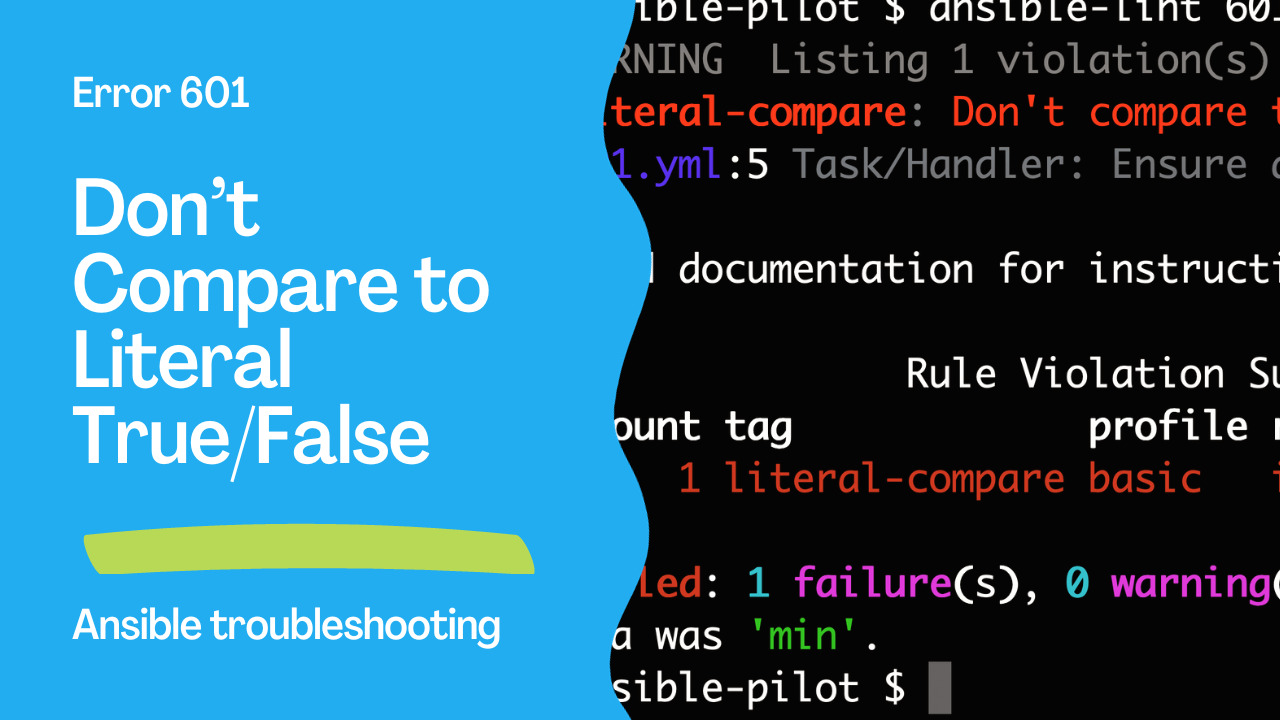Introduction
Ansible is a powerful and versatile automation tool commonly used for configuring and managing servers and infrastructure. It allows you to define your infrastructure as code, making it easier to maintain and scale. However, like any software tool, Ansible has its own set of error messages and warnings, which are essential for troubleshooting and improving your playbooks. One common error message you might encounter is [601] Don't compare to literal True/False. In this article, we’ll explore what this error means and how to solve it.
Understanding the Error
The [601] Don't compare to literal True/False error is raised by Ansible’s built-in linting mechanism, which helps identify potential issues and best practices in your playbooks. This particular error message suggests that you are using a redundant comparison in your playbook, specifically when comparing a variable to True or False.
Here’s an example of what might trigger this error:
---
- name: Ensure production environment is configured
hosts: all
tasks:
- name: Ensure a task runs only in the production environment
ansible.builtin.debug:
msg: "This is a production task"
when: production == True
In the above example, Ansible is flagging the line when: production == True as problematic. While it’s technically correct to compare the production variable to True, Ansible suggests a cleaner and more concise way to express the same condition.
We can test the playbook using the ansible-lint utility:
WARNING Listing 1 violation(s) that are fatal
literal-compare: Don't compare to literal True/False.
601.yml:5 Task/Handler: Ensure a task runs only in the production environment
Read documentation for instructions on how to ignore specific rule violations.
Rule Violation Summary
count tag profile rule associated tags
1 literal-compare basic idiom
Failed: 1 failure(s), 0 warning(s) on 1 files. Last profile that met the validation criteria was 'min'.

Solving the Error
To resolve the [601] Don't compare to literal True/False error, follow Ansible’s recommended best practice, which is to directly reference the variable without a comparison to True or False. In most cases, you can simplify your condition like this:
---
- name: Ensure production environment is configured
hosts: all
tasks:
- name: Ensure a task runs only in the production environment
ansible.builtin.debug:
msg: "This is a production task"
when: production
The updated code snippet is functionally equivalent to the previous one but cleaner and more concise by simply using when: production, you are already checking if the production variable evaluates to True. If production is True, the task will execute, and if it’s False, the task will be skipped, which is the desired behavior.
Why It Matters
Using when: production instead of when: production == True not only makes your playbook more readable but also follows Ansible’s best practices for playbook development. This best practice is important for several reasons:
- Readability: It improves the clarity of your code by eliminating unnecessary comparisons. When someone else reviews your playbook, they can quickly understand the intended behavior.
- Consistency: Following best practices ensures consistency across your playbooks, making it easier to maintain and troubleshoot them.
- Reduced Risk of Errors: By simplifying your code, you reduce the risk of introducing errors during development or maintenance.
- Performance: While the performance impact of such a comparison is negligible, following best practices generally leads to more efficient code.
Conclusion
The [601] Don't compare to literal True/False error in Ansible is a valuable reminder to follow best practices and write clean, readable code. By using when: production instead of when: production == True, you not only resolve the error but also make your playbooks more concise and easier to work with. As you continue developing your Ansible playbooks, watch for similar linting messages and embrace best practices to streamline your automation tasks.
Academy
Learn the Ansible automation technology with some real-life examples in my
Udemy 300+ Lessons Video Course.

My book Ansible By Examples: 200+ Automation Examples For Linux and Windows System Administrator and DevOps

Donate
Want to keep this project going? Please donate
